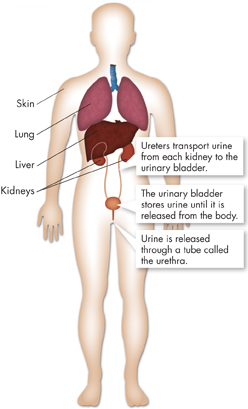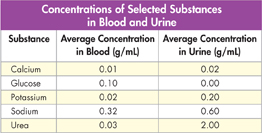The Skin The skin excretes excess water, salts, and a small amount of urea in sweat. By releasing sweat in very small amounts, this process eliminates wastes even when you may not think you're sweating.
The Lungs The blood transports carbon dioxide, a waste product of cellular respiration, from the body cells to the lungs. When you exhale, your lungs excrete carbon dioxide and small amounts of water vapor.
The Liver The liver plays many important roles in excretion. As we have seen, one of its principal activities is the conversion of potentially dangerous nitrogen wastes, a product of protein breakdown, into less toxic urea. Urea, which is highly soluble, is then transported through the blood to the kidneys for elimination from the body.
The Kidneys The major organs of excretion are the kidneys, a pair of fist-sized organs located on either side of the spinal column near the lower back. Through a complex filtering process, the kidneys remove excess water, urea, and metabolic wastes from the blood. The kidneys produce and excrete a waste product known as urine. Ureters transport urine from the kidneys to the urinary bladder, where the urine is stored until it is released through the urethra.
 d
dFIGURE 30–18 The Excretory System The organs of the excretory system include the skin, lungs, liver, kidneys, ureters, urinary bladder, and urethra.
dAnalyzing Data
The Composition of Urine
The kidneys are selective filters. As blood passes through them, urea, other impurities, and excess salts are removed from the blood. But important substances such as water, protein, and glucose remain in circulation. The collected waste products are excreted in urine. The concentrations of certain substances in the blood compared to their concentration in urine reveal the important work of the kidneys.
Interpret Data Which substances listed have the highest and lowest concentrations in the blood? Which substances have the highest and lowest concentrations in the urine?
Calculate Approximately how many times more concentrated is urea in urine than in the blood?

Infer Recall that urea is a byproduct of amino acid breakdown. How might the urea concentration vary in the blood and urine as the result of high protein diets? Explain.
Table of Contents
- Formulas and Equations
- Applying Formulas and Equations
- Mean, Median, and Mode
- Estimation
- Using Measurements in Calculations
- Effects of Measurement Errors
- Accuracy
- Precision
- Comparing Accuracy and Precision
- Significant Figures
- Calculating With Significant Figures
- Scientific Notation
- Calculating With Scientific Notation
- Dimensional Analysis
- Applying Dimensional Analysis





